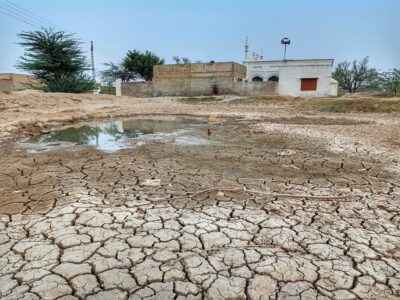The gray area of public good versus private ownership of water resources is in the news again.
In Texas, a landowner enjoys ‘absolute ownership’, and is allowed to pump and use or sell as much groundwater from under their land as they want, regardless of the effects on neighbors or other residents. Groundwater is worth the most to whoever has the biggest pump to get it out.

It’s pretty obvious that this is going to lead to problems when entire regions depend on water from aquifers that cover thousands of square miles, such as the Ogallala Aquifer (approx. 225,000 square miles). The recharge and flow of water doesn’t respect property lines drawn on maps. Regulation and management of the resource for current and future public good is going to be necessary.
As reported by the AP, these two interests have come into conflict in a high-profile way. T Boone Pickens, well known for his strong opinions on renewable energy, is hoping that selling water to thirsty cities will be as commercially profitable as he’s found oil to be, and has been investing heavily in purchasing water rights. He opposes a public groundwater management plan that interferes with that.
As part of a statewide effort to have water conservation districts control groundwater depletion, Hemphill County, in the Texas Panhandle, has approved a plan mandating that 80% of the existing groundwater will remain in the aquifer in 50 years time. Pickens claims that this restriction reduces the value of his water rights in that county to almost nothing, as extracting and selling just the remaining 20% isn’t economically viable. He estimates the lost profits to be about $10 million.
Pickens has filed a lawsuit against the Texas Water Conservation Board, asking the court to rule the plan ‘unreasonable’, and it will come down to a battle between the billionaire’s lawyers and the Texas Attorney General’s Office.
Whoever wins, it will be an important moment in the negotiation of public and private control over groundwater resources in Texas.
—
Follow Columbia Water Center on Twitter: http://twitter.com/columbiawater


From the Great Lakes to Puget Sound, from the Mississippi River to the Everglades, and from Chesapeake Bay to the Colorado – we can only protect the great waters of America if we safeguard the countless streams that feed them and the millions of acres of wetlands that help keep them clean. Perhaps that is why the Senate EPW committee rejected the spurious arguments of powerful polluters and instead voted to restore protections vital to America’s great waters. As its name indicates, the Clean Water Restoration Act does no more than restore the original scope of the Clean Water Act that our nation adopted some 37 years ago – to protect all the waters of the United States.
According to http://texaswater.tamu.edu/waterlaw.texas.htm, which is a website of Texas A&M University, “Texas courts have refused to adopt the American rule of “reasonable use” with respect to groundwater.” C Emerson- do you know if that has been updated? It would be really interesting to see how they define “reasonable.”
Your evaluation of Texas water law is a bit misleading…in Texas, underground water is privately owned as you say; however, it is not “absolute.” Private ownership and use is subject to the beneficial use doctrine, which acts as a limitation on the owner’s ability to use it indiscriminately.